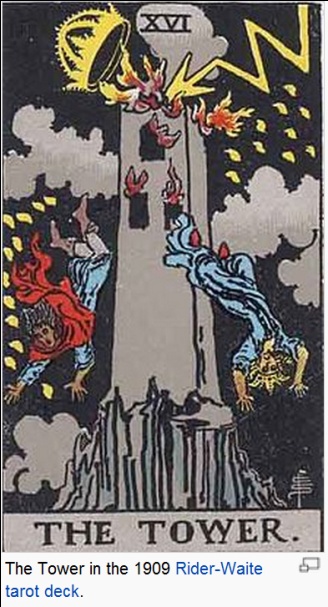 olour
and the Tarot (267 & 268)
olour
and the Tarot (267 & 268)
 olour
and the Tarot (267 & 268)
olour
and the Tarot (267 & 268)
A talk given by Eugene Halliday ... transcribed by John Bailey.
Square brackets [ ] are used to denote the editor’s comments.
Pictures of the Rider-Waite Tarot deck are found on Wikipedia.
This large diagram here is continuing something of what we said last week about colour. And we are taking this particular card of the Tarot ... the tower. On it there are three colours: red, yellow and blue. Yellow is at the top, the red is on the dexter side, and the blue on the sinister side. We are going to consider it in relation to the tower, what it signifies, namely building, construction and the cycle of birth, maturity and death.
You know that when a baby is born it is not intellectually equipped to deal with the external world at all. It is a creature of appetite, because the appetite is the first essential instinct to guarantee its continuance. It must absorb food. It must desire. So on this side here, where birth begins, we have the colour red, which signifies force, desire and will. We have to be very careful about the word will, as we’ll see later on, because the letter I in will here signifies precision of activity. In the German word for will in the infinity, it is wollen with an ‘O’, and in general therefore, will signifies a general movement. But in the first person singular it becomes will.
So that what would be a general urge in vollen, the English word will is the same word — animality, the woolliness of things — becomes in the individual an ‘I’. If you remember that ‘I’ and ‘O’ are the primary names of god with which we’ve dealt before. This line across here represents the line between the world of death and the world of life on earth. The whole diagram can be inverted as we’ll see later. Meanwhile we are pretending that death is something lower than our time life.
So the point of birth here, when the child first appears, is the part from which we will start. The child is born red ... that is to say, desire impelled. And it will grow gradually to another state which we represented by yellow ... a state of equilibrium of feeling. And later on in its life, in the stage called the mature stage — the ture in maturity means law — it will have so informed its own will that it will be aware of the formal significance of what it wants to do, and will then have control, within its field of experience, of its own actions. [3:28]
T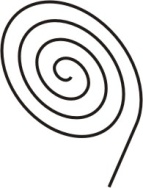 his
cycle recurs over and over again, throughout the life of an
individual. You are full of desire at one moment, and the control
that is necessary to fulfil desire necessitates you passing from a
red-angry state, a state of thwarted-will, through the feeling, to
the idea. The idea tells you whether or not that thing can be done.
And if it can be done there is then a rebirth of energy into the
desire side. It is the addition of idea to this force that changes
mere force into will. [4:17]
his
cycle recurs over and over again, throughout the life of an
individual. You are full of desire at one moment, and the control
that is necessary to fulfil desire necessitates you passing from a
red-angry state, a state of thwarted-will, through the feeling, to
the idea. The idea tells you whether or not that thing can be done.
And if it can be done there is then a rebirth of energy into the
desire side. It is the addition of idea to this force that changes
mere force into will. [4:17]
The idea is symbolised by this letter ‘I’, which if you remember it, the Hebrew for it is just a dot, written like that in Hebrew, hence a spiral would be good enough, like a comma. That means precise form ... formulation. And the desire of the child is too diffused, too unformed for the child then to fulfil its own desire. And therefore for the period of its redness it is dependent upon adults who are already formed and therefore can give it what it requires to help its development.
Now our primary colours, red, yellow and blue, have intermediary colours: orange, green and violet. So that if we look at this feeling of equilibrium we will find in yellow there is no heat suggestion as there is in red, and there’s none of the coldness that there is in blue. It is the lightest colour in the spectrum and therefore is the nearest to white. The complementary colour of that yellow is violet, which is the union of red and blue, and gives us the darkest colour in the spectrum, which is the nearest to black.
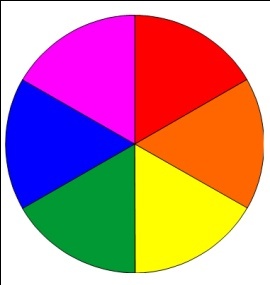 You
know that violet is the colour of mourning, isn’t it? So the
dark violet is already suggesting the possibility of the
disappearance of the colour completely in the black ... which is
death.
You
know that violet is the colour of mourning, isn’t it? So the
dark violet is already suggesting the possibility of the
disappearance of the colour completely in the black ... which is
death.
Now every child at birth is equipped with certain inherent forces of desire, instinct and so on, which drive it to feed and then to try later to express itself in muscular activity, and so on. And as it is going up to express itself, forces already in existence in the environment on here, on the formal side [right side of the card], are working against it, to control it. So we can say that at birth, there, the forces that actually control the birth of the child have an equilibrium with the force in the child. And this line of equilibrium is going to pass around the circle. The force of the child is going to battle against the form forces of the adult.
So that there’ll always be a line which will represent the equilibrium between the educational forces of form and the desire forces of the child. And as the child gets older and older, if the child is lucky enough there will be a controlled diminishing of the desire by the application of form to the desire ... not too rapidly. [07:23]
If you put too much form onto the child prematurely you’ll choke its natural urge and cause it to become depressed, to become negative, and to wish to return to the place it came from. This is what psychologists call the death wish, which any human being experiences in some degree at some time in their life. Many people commit suicide, and suicide is always caused by the same thing: it’s the pressure of form existent against the desire, threatening to push the desire forces down so that they cannot express themselves, with the result that the force of the child, it’s consciousness, decides it is no good trying to go against the formed forces from outside, and it decides to return. All the regressive states that we find in psychological cases of movement back to the womb, back to mother, and so on, are the product of formal forces from outside, pressing the desire force backwards. [8:31]
So if we wanted to do, we could set a number of years around here, to show the normal — norm means the standard, not the average, average people are not at the norm, the norm is the true standard for any being — and we could say that at a given age a certain amount of desire in the child should be balanced by a certain amount of form. Now the form here should gradually withdraw to allow the desire to express itself, and at the same time shield the desire so that it doesn’t cause its own destruction. In other words the child has to be allowed to grow up from it own centre, and yet because that would result frequently in the early death of the child through adventurous processes, it should be shielded, and the shield should be gradually moved back so that the forces of the desire begin, through experience, to formulate themselves.
So the whole of the education process really is the transference of form from this side onto this side so that the growing being, driven by blind desire, shall come into formal consciousness very gradually ‘til it reaches maturity.
If we get a child and actually tell it prematurely what it will be thinking in another thirty years, to the point of convincing the child that will be so, the child will become sick ... because it would mean in effect that you have prematurely informed certain parts of the mind of the child and anticipated for it a development that it should find out for itself. And at each age, desire wishes to do a certain thing.
If we take say the Freudian analysis, a child at birth has what is called an oral fixation: the sensation from which it derives greatest pleasure is in the mouth, which guarantees that the child will feed because it actually derives terrific pleasure sensations in the act of feeding. [10:54]
Now, once it’s taken in food, a process of digestion will reduce that food in a certain way and then a certain amount of waste matter will result. And then the next phase of the child will be when it derives pleasure from excreting the waste products, and this is called the anal phase ... when the child is actually pleased with its own excrement, and thinks it’s a wonderful stuff that it’s produced, worthy of worship by mothers and so on. And if the child is inhibited at that period, it actually can be arrested in the anal phase, and certain types of homosexual behaviour derive from a fixation at that level.
At each stage of its life a certain desire tries to express itself. If intelligent formative forces protect it but allow it to experience that thing and then explain it after the fact — not before it — the child grows on to its next experience level. [12:01]
You know for instance that at puberty certain forces of desire are ready to express themselves in a way that a few years earlier they would not have dreamed of indulging in at all. Small boys won’t play with girls because they consider it stupid, and then a few years afterwards they will play with them and think it’s stupid not to. And each one of these divisions of time — at the end of which a new desire appears for the next period — can be called a step, if we like to consider it.
Sometimes it’s called a degree when we consider it as a subdivision of the circle. The question of initiation by degrees is just this question of letting somebody find something out at a particular time and place, and not forcing them prematurely to consider something when they have no data for it. It is useless to give formal data to a child newborn about the eleven plus, because it has no desire in that direction and can’t respond.
So they may be called degrees if we think of them as sub-divisions of the circle. They may also be called steps if we like to think of them going up and going down. Nietzsche the German philosopher, when he said, if you miss a step it will never forgive you, meant precisely this. That if a child — through excessive demands upon it by the formal, mature side of the parents and educators cause a child to skip physically a certain experience — nevertheless the tissue of the child actually has that potential of experience in it. And later on when it grows up and the formative forces are removed from it — because with the passage of years the child is then supposed to be grown up — it discovers an unresolved problem which really belongs to a very early stage in its life, and it then reverts to consider this problem. [14:06]
So if we consider those as essential experiences with correspondent desires for each experience, and correspondent formal knowledge to control each experience, then we can consider them as steps and we can see immediately what Nietzsche meant by saying, if you miss one out it won’t forgive you. Because if you don’t experience the proper satisfaction of those desires, they remain at deep levels inside the organism in a state of dissatisfaction, and they will express themselves later on.
So we see here that growing up is really the product of two forces, the force of desire there [red side of the card], and the force from the adults [right side of the card] acting upon it to control it. And that the control must not be such as to force the desire backwards, and it must not be such as to try and get underneath it and force it upwards to produce a tall but weak plant.
If we take that this represents the life of a man, and we could divide it into seven years, seven years, seven years and seven, then we would say that the first seven years of that child’s life ... it should have gone from red to orange. That is, from its primary mode of expressing itself by screaming and kicking and so on, it should have begun to feel the possibility of equilibrating its feeling and then at this point of feeling equilibrium, we will say corresponds with the point of puberty, and there new forces come in from the equilibration of all things — the universal light itself — which cause in the feeling the need for a relationship. [16:09]
We can say that prior to that time the child is growing in egotistic realisation, and that with the influx of this new force it suddenly feels that it must have a relation with another being outside itself. So this is the point of introduction of the force from outside which reminds an egoic being that there are other beings in the universe, and that it is only a part and must be related to other beings. And in the first stages of the erotic feeling at puberty it is always a feeling in which there is a desire to sacrifice oneself, to abandon all the egoic values that have been built up, to give as much as possible away to the loved person.
So in that state — which doesn’t correspond with the married state, as we know — there is a real desire on the part of the partner to give and not to receive. And it’s the part of life where the greatest enjoyment is received, precisely because giving is better than receiving.
|
|
If we say, here is a being and that being has force in it and it gives the force out to another being that will receive it, this being feels good in the giving. And the reason for it feeling good is because there is a door on the inside of itself. And that door is the door to another plane of being. So that if there is a real attempt to give physically, then there opens a door inside, which replaces all the forces of egotism which were materialistic with other forces, non-materialistic. |
So it is more blessed to give than to receive means that giving at the material level actually opens the door inside the giver.
And at this point we often find a young boy and girl actually fighting about the right to give. He will want to give her a good night out. She will want to give him his choice of where to go. And he will want to give her her choice of where to go. And so a very peculiar conversation develops in which…
…Nietzsche said, I will go before the sun and I will address the sun and declare to it, ‘what is the good of your shining if you have not got me to shine on?’ Now all givers are dependent on receivers, and if they can’t find somebody to receive, they’re going to have a very, very rough time because they will become internally tumescent with forces which should be let loose.
Now we know that in general this giving process is masculine in the physical world, and feminine in the feeling world. So the attempt on the part of a man to give, produces frustration if he can’t find a recipient. And at the same time the attempt on the part of the woman to give affection in exchange for some physical gift frustrates her. She likes him to feel that he needs her. A lot of arguments will come out of this. [19:36]
Do you really want me? she says.
Well I want to give you something, yes.
But why do you want to give it to me? Do you need me?
And she tries to drag out of him a demand for a movement of her feeling this way for protection. And if he is at the merely at the physical level, the naughty level of say the naughty boy at the Ritz who doesn’t go dancing with the girl, he only goes in for the last waltz [laughter]. That naughty boy has no need for the lady, and therefore in general she tends — but not always — to say, No. I can’t give you anything ... but love. So we have to see this relation here and we can say, this is the giving side, and this is the taking side. [20:19]
And remember our dialectical law: these two really are the same force, altered in phase. When the red, angry desire force pushes into an environment, the environment restricts that force, and the restriction is formation. Formation of that force is the same thing as growth in idea. So that every idea you’ve got is really a restricted force. It once strived to act formlessly and was pinched by the environment into a shape ... which shape you call an idea.
So that we could say that the idea furniture of everyone’s mind is peculiar to him, and represents the number of desires that he had that have been thwarted. Every idea is a thwarted desire. The amount of thwarted desire determines the strength of the idea, and we find historically that the people with the greatest amount of thwarting are the greatest figures of the world ... in idea.
So we’ll find that the men tried to choke themselves in the early Christian period by crushing the desire forces of their life into the pattern of a religious dogma found that when they succeeded in doing so, all the energy of the desire forces had gone into the dogma. And they then proceeded to hit people with the dogma very, very hard instead of with the undefined desire force. The undefined desire force would have acted indiscriminately over a wide field, and the compacted desire force now embodied in a dogma is like a hammer with which they go out and tap everybody on the head and convert them into believers.
So we know that we can’t have a powerful idea unless we’ve had a really jolly good thwarting of a desire force. And therefore we know what to do with people who’ve been thwarted. The thing to do is give them their own way, because if they’ve been well thwarted they are going to hit very, very hard. So unless you can divert them — which simply means to let them get what they want in a way other than they want it — the best thing is not promptly to oppose them. Every idea is simply a force which has been spiralled into a centre by external restrictions. [22:48]
I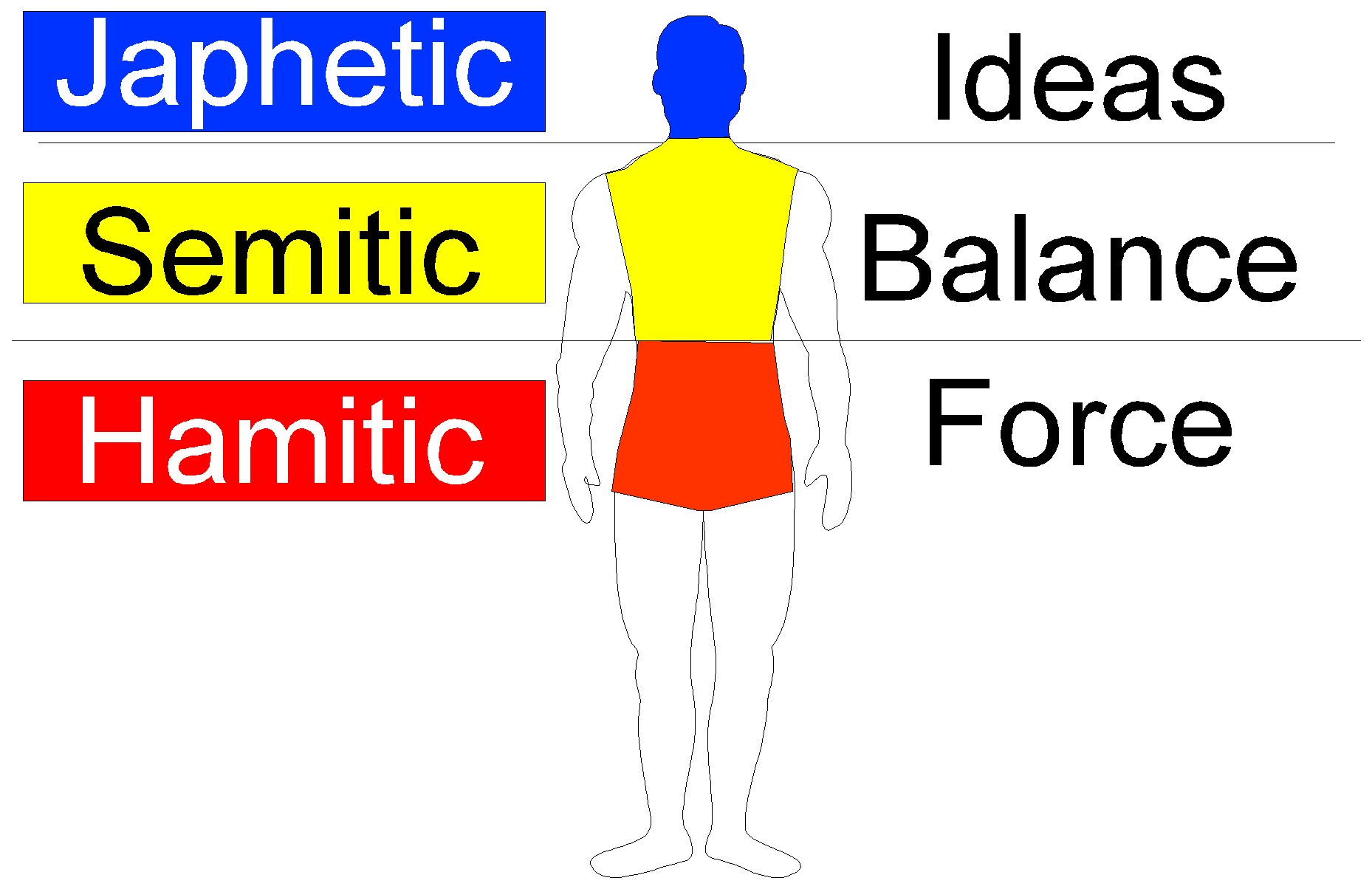
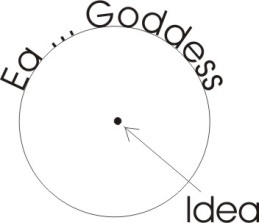 f
we take the — the word idea is a Greek word — and this
part of it [ea] really is the same word as goddess, as opposed to
god. And the dot, the ‘I’ there, the iota, is this
dot in the centre. So this is the goddess and this is the compaction
of the idea. And we’ve said that the intellective tendency is
what we call masculine, which makes all this side here feminine.
Which is very difficult to handle unless we remember our dialectical
principle that the whole of the force and desire side has to pass
through a feeling state — like the belly urge has to go through
the feeling state here — before it can become compressed
through environmental pressures as idea.
f
we take the — the word idea is a Greek word — and this
part of it [ea] really is the same word as goddess, as opposed to
god. And the dot, the ‘I’ there, the iota, is this
dot in the centre. So this is the goddess and this is the compaction
of the idea. And we’ve said that the intellective tendency is
what we call masculine, which makes all this side here feminine.
Which is very difficult to handle unless we remember our dialectical
principle that the whole of the force and desire side has to pass
through a feeling state — like the belly urge has to go through
the feeling state here — before it can become compressed
through environmental pressures as idea.
And when the person is reasonable in practice then we say that that person is masculine. And before they are reasonable in practice we say that those people are feminine. Now we remember that the human being is a hermaphrodite, is both male and female, and the two ends of his body are polarised accordingly. So if we place the head here and belly here, we will put red down there and blue there and yellow there.
A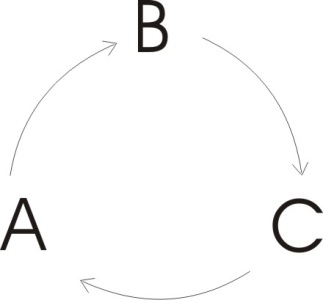 nd
the form side is the blue, so that is the male. The red side belongs
to the ladies. So always, this yellow, this point of equilibrium,
this mean, is that through which these two have to pass. The child is
situated in its consciousness in the digestive department. It has a
little sensation put in the mouth to make it pleasant to get it down.
And then the whole of the consciousness goes into there and then it
shifts down to the bottom for excretion, and then it goes back up
again. [25:06]
nd
the form side is the blue, so that is the male. The red side belongs
to the ladies. So always, this yellow, this point of equilibrium,
this mean, is that through which these two have to pass. The child is
situated in its consciousness in the digestive department. It has a
little sensation put in the mouth to make it pleasant to get it down.
And then the whole of the consciousness goes into there and then it
shifts down to the bottom for excretion, and then it goes back up
again. [25:06]
And as the forces outside from the adult world act upon it, the child’s consciousness is gradually forced up into the head. So that it really begins to believe that it cannot get away with a simple desire statement. It learns to do what we call rationalising-its-desires. It will always try its best to give an explanation why it should do so-and-so, why it should be allowed to do so-and-so. It learns very early on in life not to say simply, I want it. And instead of saying simply, I want it, it’s saying, I have a reason for wanting it, it is really being imposed on by society ... by the formal adult world in which it finds itself. [25:54]
I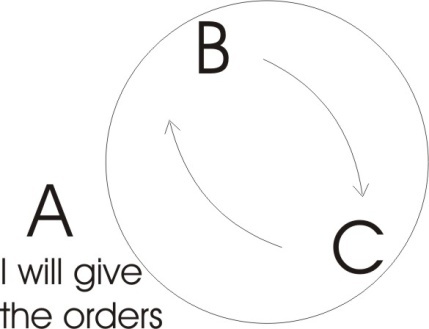 f
we take several beings — if we take the least number we can
deal with comfortably ... three — then if we said this is A, B,
this is C, and these three beings are equally valid and they have
force in them — desire — if A decides to move that way,
and B who is the object of A decides to move to C, and C doesn’t
like B and moves to A, there is going to be a peculiar situation in
which the desires will cause those bodies to rotate. And unless there
is absolute coincidence of their desires at the same moment there
will be no agreement, but a conflict will arise. And in the conflict,
because of the inequality of finite beings there will be a greater
degree of energy in one than the other. And that one will begin to
tyrannise over the other two and then declare itself to be the top.
We’ll say it’s this one for a moment: that one now says,
I will give the orders to the other two. And the moment it has
decided to fulfil its own desires by imposing a rule on the other
two, it has established what we call Law. The law which is
from the outside as far as these two [A and B] are concerned but
which is from the inside as far as he [A] is concerned.
f
we take several beings — if we take the least number we can
deal with comfortably ... three — then if we said this is A, B,
this is C, and these three beings are equally valid and they have
force in them — desire — if A decides to move that way,
and B who is the object of A decides to move to C, and C doesn’t
like B and moves to A, there is going to be a peculiar situation in
which the desires will cause those bodies to rotate. And unless there
is absolute coincidence of their desires at the same moment there
will be no agreement, but a conflict will arise. And in the conflict,
because of the inequality of finite beings there will be a greater
degree of energy in one than the other. And that one will begin to
tyrannise over the other two and then declare itself to be the top.
We’ll say it’s this one for a moment: that one now says,
I will give the orders to the other two. And the moment it has
decided to fulfil its own desires by imposing a rule on the other
two, it has established what we call Law. The law which is
from the outside as far as these two [A and B] are concerned but
which is from the inside as far as he [A] is concerned.
So this fellow will declare himself a king. And he would tell the other two that they were not the elect. He would say, I am the elect. And he would know to what he referred, namely superior force. And this force, in the struggle, has passed from an undifferentiated state through the actions of the other two upon him into a more formulated state. So that in effect it might mean that the two with more force caused the other one to be more inhibited and he might have given birth to the law, which he then persuades the others — by the power of the tongue — to adopt.
S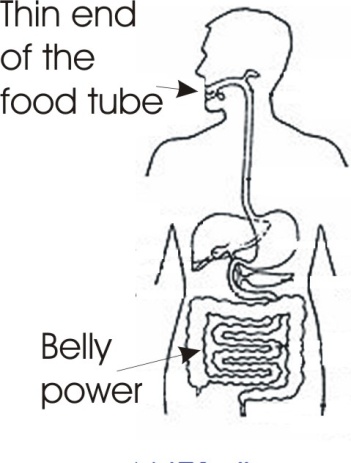 o
you see that in the case of the food tube wiggling about, it has a
very thin end and the force of that food tube is getting tighter and
tighter until it comes onto the tongue. So if we said that all the
force is resonant in this large intestine here — what the
Japanese call belly power that their wrestlers and Zen specialists
are fond of — if we introduce several such belly powers, they
fight. And in the pressures they inhibit each other, and in the
inhibition a message is translated to the other end. And one then
sues for peace. And in order to get a good settlement, he has to use
the energy that he had — which had been inhibited by the
pressure of the others — to explain why he should be allowed to
live. And if he’s very good at it he can explain exactly why he
should be allowed to live and he’s then the recipient of the
title king, which he confers upon himself by his superior
capacity to argue the case at a non-muscular level ... although the
tongue is a muscle.
o
you see that in the case of the food tube wiggling about, it has a
very thin end and the force of that food tube is getting tighter and
tighter until it comes onto the tongue. So if we said that all the
force is resonant in this large intestine here — what the
Japanese call belly power that their wrestlers and Zen specialists
are fond of — if we introduce several such belly powers, they
fight. And in the pressures they inhibit each other, and in the
inhibition a message is translated to the other end. And one then
sues for peace. And in order to get a good settlement, he has to use
the energy that he had — which had been inhibited by the
pressure of the others — to explain why he should be allowed to
live. And if he’s very good at it he can explain exactly why he
should be allowed to live and he’s then the recipient of the
title king, which he confers upon himself by his superior
capacity to argue the case at a non-muscular level ... although the
tongue is a muscle.
S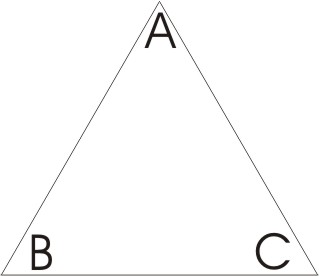 o
here we have the primary state, the simple pyramid of all society
whatever. We have the being declaring himself king at the top, and a
couple of subjects. It’s better to have two subjects than one,
because if you have one it is probable that a disagreement might
arise and result in a direct confronting of yourself with him,
whereas if you have two, you can always get the other one to sequest
the one that objects first. This is the principle of divide and
conquer. So that finding the difference of desire between those two
helps this king to maintain his position. [30:11]
o
here we have the primary state, the simple pyramid of all society
whatever. We have the being declaring himself king at the top, and a
couple of subjects. It’s better to have two subjects than one,
because if you have one it is probable that a disagreement might
arise and result in a direct confronting of yourself with him,
whereas if you have two, you can always get the other one to sequest
the one that objects first. This is the principle of divide and
conquer. So that finding the difference of desire between those two
helps this king to maintain his position. [30:11]
I’m just going to take this Tarot card now. In it we have a red man and the tower and a yellow crown up there, and a red man falling down here and a blue man falling down here. Now this tower represents the social structure or the ideological structure or the philosophical system or the religious system that has been erected by the man who could balance the other two. We’ll see just why, although that is the middle phase of life, you have to come back to it in the end. Here we have force undefined [red, left], and here on this side we have force fully defined [blue, right]. And where it is completely defined all the force has involved itself into idea so there is no energy left to apply the idea. We this in the case of intellectuals who understand perfectly a certain subject to the point of depletion of energy. They can’t do anything about it. They can only think about it. So it then becomes necessary for them to go backwards to the mean, or straight through into a rebirth, determined to stop there. The attempt to go backwards, called back-to-the-middle-ages by some philosophers, back to the feudal system and so on, doesn’t work very well. Much better is this process of going right round. And we see how we do it, but it requires a lot of energy in order to do it. [31:49]
W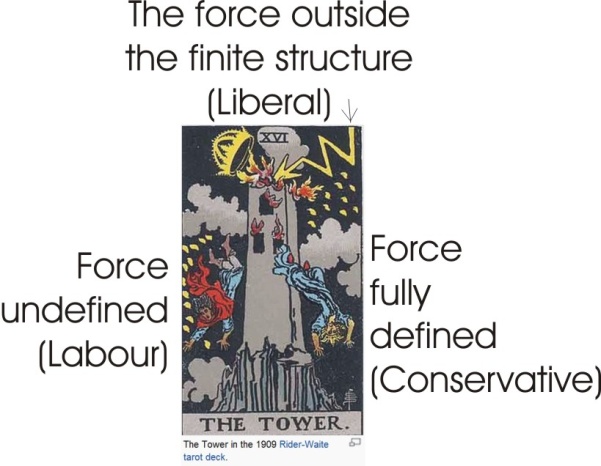 hen
we build any system whatever, symbolised by the tower, the mere fact
that we have built it out of form — which is contemporary,
because we have no other kind of form — means that it must
break. It’s got inherences in it of internal contradiction, and
therefore there comes out of the sky the lightning which symbolises a
force having its origin outside the structure that the finite man has
built. And ultimately this force must come and knock your tower down.
And therefore this card is a warning to the desire-driven, to the
intellectual and to the equilibrator: that every finite structure in
man has its term and must eventually be destroyed by a non-finite
force ... the lightning. The lighting itself can symbolise the light
of a new idea. [32:50]
hen
we build any system whatever, symbolised by the tower, the mere fact
that we have built it out of form — which is contemporary,
because we have no other kind of form — means that it must
break. It’s got inherences in it of internal contradiction, and
therefore there comes out of the sky the lightning which symbolises a
force having its origin outside the structure that the finite man has
built. And ultimately this force must come and knock your tower down.
And therefore this card is a warning to the desire-driven, to the
intellectual and to the equilibrator: that every finite structure in
man has its term and must eventually be destroyed by a non-finite
force ... the lightning. The lighting itself can symbolise the light
of a new idea. [32:50]
If we take the Hegelian view which Carl Marx borrowed, for every period of time we have a thesis ... a control idea which is going to develop. And then that idea will come to its natural term. It ceases to be so useful and is confronted by an opposite idea called the antithesis. And the two will struggle together and the result will be a synthesis ... a balance between the two. This yellow is the colour of the synthesis. And yet that synthesis has to be made the thesis for the next generation.
We’ve just narrowly escaped a lot of trouble through the introduction of automation. But because we had a lesson during the previous attempts to produce automation — like the invention of the Spinning Jenny and so on when machines were destroyed by unintelligent action of force, not so very long ago — we have now learned that destroying the machines does not destroy the idea, and that an idea must come. Christ says, sorrow must come, and woe to him by whom.1
The man who introduces the idea — we can call this the conservative side if you like, and we can call this the labour side — the man who introduces a new idea to labour is acting in the capacity of an inhibiting factor on the expression of force. So that if we threaten a body of workers today with an invention which will put them out of work, they will want to break it. And it needed quite a lot of propaganda in the last few years to remove from people in general the fear of automation. And there had to be a lot of radio programmes and newspaper talk reminding them of the smashing of the Spinning Jenny and various other inventions, and to let them know that an idea must come. And they’ve been told very funny stories about automation saying, it actually requires as many men to look after the new automation units as it does before they come in. This is so that they won’t be worried about possible unemployment. [35:07]
So we can say, conservative here, labour there, and that should be liberal. Now we know that the symbols of these have been switched politically, don’t we? What is the colour of the Liberal Party?
We know that the primary meaning of it originally is, there were only two parties, weren’t there?
Because the desire stuff down here was considered to be of no account ... not allowed to express an opinion, because it hadn’t got one. Not so very long ago, as you know, people that didn’t own any property hadn’t got a voice in the government. They were considered to be just so much of animal energy to be directed by these forces. And there were two kinds of forces:
The Tory forces ... Law, Tory.
And Whig forces. Those were men who had been ignorant but now were no longer ignorant and were fighting their way against the Tories. And these were the men who had reached the stage of realising that they could rise on the difference of opinion between form and force ... between the Conservative element with its idea of the triangle, that hierarchy, the pyramid, and the blind forces down here, those would be the workers.
S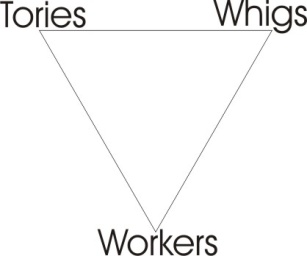 o
this fellow began to tell these men down here that they had rights.
Actually they had no rights at all until they were conferred upon
them. Because there is no right fundamentally, other than
might. But the might, to become right, has to be
made aware of the fact that might is right. Prior to might
being illuminated it wasn’t right. It was defined as
wrong, by this side [Labour]. So if we take this triangle, we could
then consider that one to be underneath.
o
this fellow began to tell these men down here that they had rights.
Actually they had no rights at all until they were conferred upon
them. Because there is no right fundamentally, other than
might. But the might, to become right, has to be
made aware of the fact that might is right. Prior to might
being illuminated it wasn’t right. It was defined as
wrong, by this side [Labour]. So if we take this triangle, we could
then consider that one to be underneath.
We just turn the diagram round and we’d have the Tories and the Whigs here and the ordinary folk down there, and these two then began to sue for influence over the large masses, who are beginning to threaten to invert the pyramid. Now out of this battle has arisen trade unionism and all consciousness in people that they might conceivably have something to do with the government of their own lives. [37:43]
The same thing happens internally in an individual, exactly. When you are born as a baby there’s a conservative element ... your daddy and mummy. They know all about it before you start, and they are going to impose a rule upon you. At first you have to accept it because you must be fed. But very, very soon you find out that they don’t always feed you when you want to be fed, or the stuff you want to be fed, and they don’t always give the right messages to Santa Claus, and so on. And so you conceive that you should hit back somehow. And this is the travelling of this line of equilibrium ... where the child is actually fighting against his parents. The Oedipus complex, the Electra complex, are simply psychological terms for the fight of sons with daddies and daughters with mammies.
So inside the individual we find that the idea which is imposed always fights the desire inside the person. If we don’t have plenty of desire energy, we are not very, very strong. But if we do have plenty of desire energy and no formal capacity, our desire energy will be subjected to the command of another being outside ourselves. Somebody must order this desire energy. If an individual cannot order it from the inside himself, he will in fact in society be subjected to somebody who can. This is the source of the command, control yourself or somebody else will control you. So the evolution around here of consciousness is in the individual towards the realisation that a desire must be formulated before it can become efficient. [39:30]
In this card which we have seen, the three elements are the red man falling down, the blue man and the crown of equilibration. We know that the balance of power is the fundamental concept that all governments of the world try to apply in order to keep their position. We know that it depends on the opposition between idea and force.
If we look in the middle-east today we can see examples of this ... the force of the Arab people and the idea of unifying that force. If those people who have been largely nomadic for a few thousand years can be imposed upon or controlled — or, as the ladies would say, illuminated — by the idea, then they will be carried into a formulated state; a society which can then be used as a weapon by the men who formulated it. So in international relations we find at the very point where a given group are trying to impose an idea on these millions, another group, fully aware of the significance of ideas is determined to pump in from another direction, other formative forces. So we find the British and the Americans and the Russians are all busy pumping ideas into a people who are not very well formulated. [41:08]
F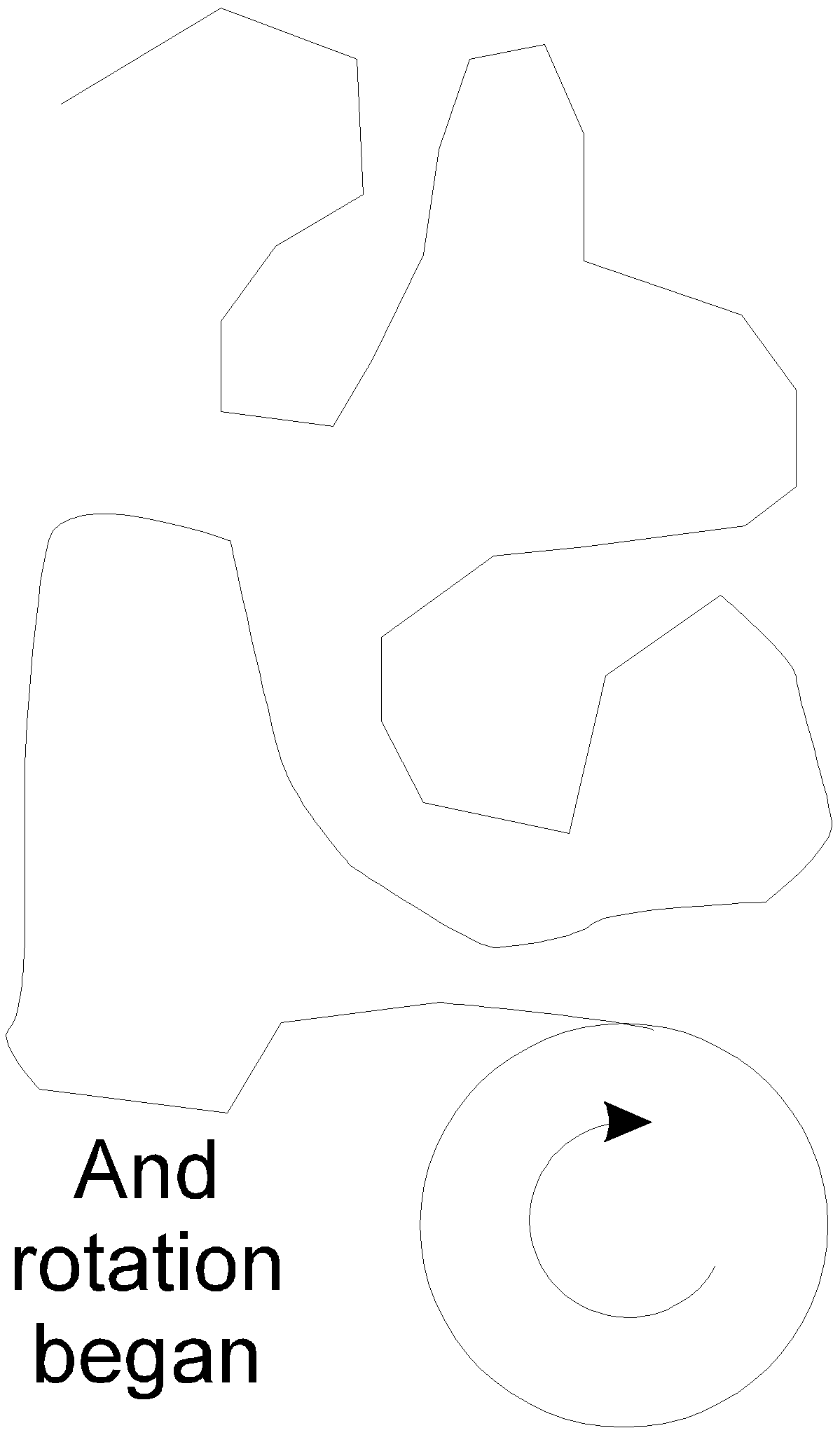 rom
the point of view of ourselves as individuals, we know that the
desire forces in us will never be any use to us until we indoctrinate
them in the manner that will cause them to be efficient. And we have
exactly the same problem inside our own physical organisms and
psychic structure that any external statesman has in dealing with
masses of people.
rom
the point of view of ourselves as individuals, we know that the
desire forces in us will never be any use to us until we indoctrinate
them in the manner that will cause them to be efficient. And we have
exactly the same problem inside our own physical organisms and
psychic structure that any external statesman has in dealing with
masses of people.
First the impulses in us which are not formulated, which are not rational, don’t want to listen to reason at all. All they want is their own way. They want expression. They want what they want when they want it. And they have to learn slowly — and they don’t like learning — that they can’t have what they want when they want it ... but only sometimes. And therefore we have to find ourselves a control concept big enough to promise all the unruly impulses in us ultimate satisfaction. It’s no good telling even one of them that it will never be satisfied, because if you do, that one will revolt. We know for instance in the case of the reign of the light of Mohamed, it all depended on the formulation of the concept of heaven for them. Their heaven is a wonderful place, full of streams and beautiful ladies and everything desirable to eat. Without that formulation they would not have considered it a good thing to die, because the impulses in them can only move towards what they want. [42:48]
So if we take the lower part of the body, you can’t talk to that lower part and say, instead of having a nice beautifully prepared meal, we are going to read you the ethics of Aristotle for dinner. It doesn’t listen.
And in the same way, when that has been satisfied, this feeling department is only concerned with a feeling relationship. And it will not be satisfied with the rationalisation of it, nor with a good meal.
So we have to realise that inside ourselves we have three nations. We can see that these three nations are represented in the world.
We know that there is a nation tends to balance [Hamitic people in the will]
We know that there is a nation that believes ultimately in force [Shemitic people in the feeling]
And another nation that believes in ideas [Japhetic peoples in the intellect].
[the three tribes descended from the three sons of Noah].
And we know that in general we can say the Hamitic people belong here [in the belly], the Shemitic people here [in the chest] and the Japhetic peoples there [in the head]. So we have to balance exactly inside our own individual economy the problem that the statesman has on the outside. And we really have no right to complain about the bad solution of an international problem, unless we can find a good solution for its equivalent inside our own bodies.
Now there’s another card here: the wheel of fortune. And it has the wheel inside it, with the Tarot and the four letter name of god [yod, hé, vov, hé, the tetragrammaton], part of which we’ve dealt with before. Inside this wheel [running round the periphery], are made of the ROTA here, and the name of god here. You know it has been suggested that we made ourselves a kind of Hamitic star out of that one. The rota is simply the rotation of the forces of the universe, which prior to creation were just weaving about and making nothing at all. They were just going like this, lazy-mazy. And when rotation began, that rotation was the guarantee of order to be set up.
And the rotation depended upon the forces represented by the letters of the name of God.
|
Yod – the Father. pointed positive energy
|
Hé – Motion. All motions in the closed space |
Vav – the Son. The short letter lengthened |
Hé — Jehovah. |
I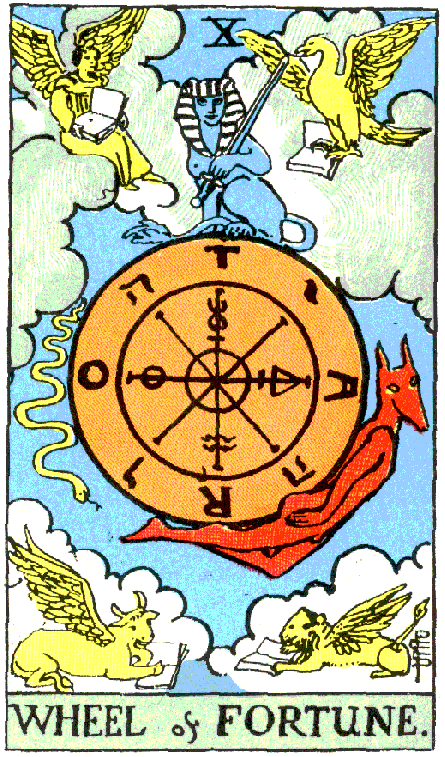 n
its very short form we put the dot [Yod] down and say that dot equals
positivity, and we can say that this letter [Vav] equals negativity.
And the positivity is always smaller, more compact than the
negativity. So the energy of the negative is spread over a large area
and we can call it a field. And the energy of the positive there is
very small and is applied at a point in the field. So when we look at
the situation, we’ve represented the dot by a little arrow
striking a plane surface and it produces in the plane surface a
motion. That motion is represented by this letter. We’ll draw
it below and say all this is thrown into motion. There’s the
cosmic ocean, a body of water, there is the impulse from the first
letter of God’s name striking it, causing a vibration. And the
vibration here is the letter of the son.
n
its very short form we put the dot [Yod] down and say that dot equals
positivity, and we can say that this letter [Vav] equals negativity.
And the positivity is always smaller, more compact than the
negativity. So the energy of the negative is spread over a large area
and we can call it a field. And the energy of the positive there is
very small and is applied at a point in the field. So when we look at
the situation, we’ve represented the dot by a little arrow
striking a plane surface and it produces in the plane surface a
motion. That motion is represented by this letter. We’ll draw
it below and say all this is thrown into motion. There’s the
cosmic ocean, a body of water, there is the impulse from the first
letter of God’s name striking it, causing a vibration. And the
vibration here is the letter of the son.
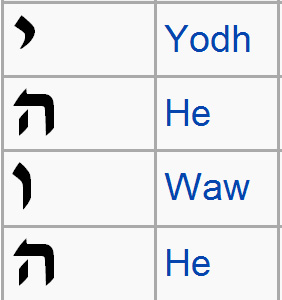

This long letter which is that short one made longer, is the son. That one is the father. Now all the motions inside here in this closed place are represented by the final letter there, that’s an aitch — Hé. So we write one inside there. We now have two kinds of form and two kinds of field. If we let this body of water which is vibrating represent our material body, then our material body has a field. And the field of the material body is simply the same field of the spiritual outside the material. So there’s a resonant relationship between the feeling inside your body and spirituality outside it.
So we now have something which we find in yoga philosophy differently expressed. We have a gross material body and a subtle body, you put that up there [drawing on the white paper], and a causal body. Now the subtle body, the gross body ... and that which gives rise to both of them is the causal body. It is obvious that if we have two different bodies and they are related together functionally, there must be third behind them.
We know that we have a physical body and we know that we have also bodies of ideas. We know that we have an idea of a hand and that when we use the idea of the hand, we can apply the idea of the hand in the material world to the hand. [48:15]
A surgeon may do an operation on an abdomen. He has a gross material abdomen to go at and he has an idea of the normal abdomen to go at. He examines the physical one and if it isn’t like the pattern he has in his mind, he alters it. He cuts a bit off or something. And because he has two bodies, namely a gross material body and an idea body, he can use the idea body to serve as the standard for operations upon the physical body. And behind it he is looking at both bodies. We see there that the consciousness of the surgeon doing the operation has two objects. So we can do the triangle of consciousness there, that is the eye of the surgeon, there is the idea or form of the body there, and there is its gross equivalent. That’s subtle form, idea, that’s gross form, the body. He looks with his consciousness at the idea and at the gross body, he com-pares them, puts the pair together, and where they are different he alters the gross one to fit the pattern.
So we there see the proper function of idea. It is a pattern world. Jung called it the archetypal world. The same thing is used in Jewish kabbalistic theory of the world absolute of pure archetypes, where all form that can appear at the gross material level — from a simple thing like that piece of chalk to the angle-poise lamp or a human organism — all the form that is there made gross already exists as idea before it appears in the gross material world.
|
As we said last week, inside the egg of a human being you will not find a human being. Nevertheless a human being presses through it. Because there is a human being in the field. A human being in the field considered as the total man, as human on earth, is called the little man in kabbalistic terms, and human beings down here. And outside it is called the big man, because we are dealing with two things, one of which is factually larger than the other. |
|
Your gross physical body is smaller than the field that contains it. The earth itself is smaller than the atmospheric envelope that surrounds it. And yet, there are various layers round the earth which belong to the earth, because as the earth is travelling round the sun it is taking its spheres with it. It doesn’t leave them behind, so they really belong to the earth. So that we can say that the earth is a precipitate inside a series of fields. We call the earth a geosphere. And we have another sphere, the hydrosphere. And then we have the atmosphere, a pyrosphere — with heat running all through — an ionosphere, and so on. All these spheres are centred on their own precipitate ... the earth.
S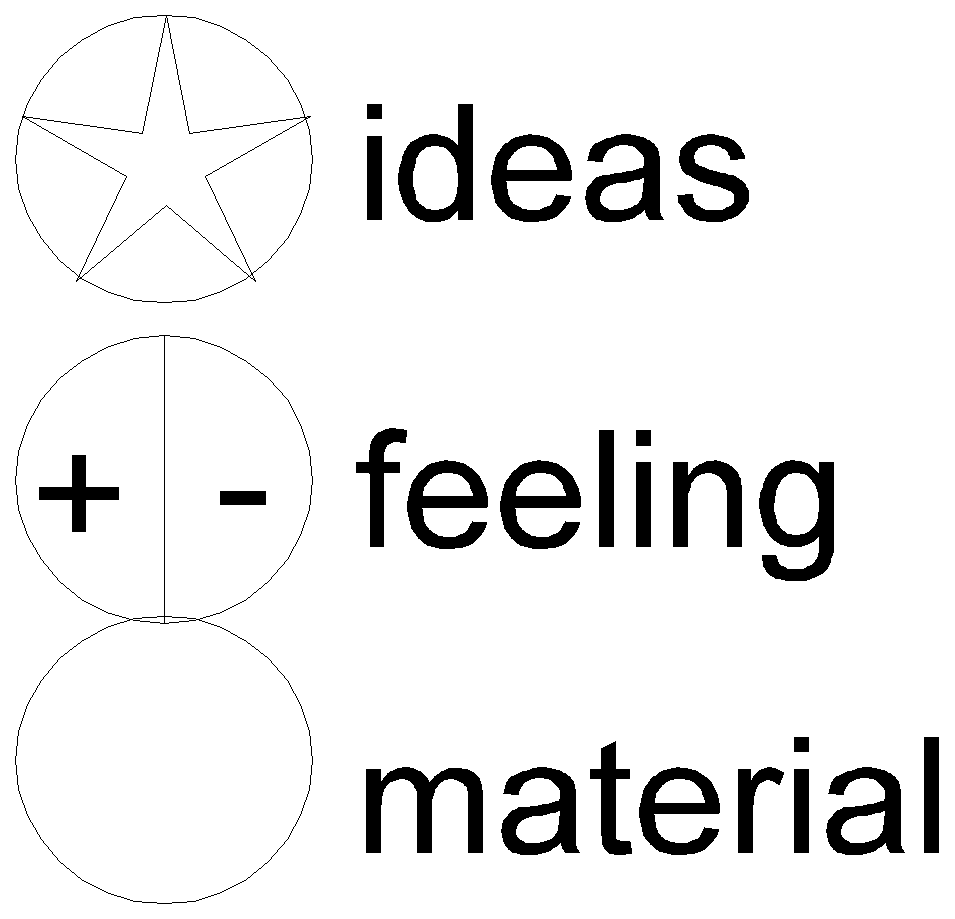 o
in this diagram of the relation, we see what it means in this
diagram, where the TARO circle has alternating with its letters the
four letter name of god which we call Jehovah. If we meditate on the
meaning of that, we can handle any situation which arises, either in
the body politic or in the body of an individual. Because if you
examine yourself you will always find something vague and something
defined. And you know that the vague cannot be efficient. So if you
allow yourself to act from the vague, your action will be vague. And
therefore you have to work upon the vague and set up a form round
which the vague will precipitate. And that form is what we call an
idea. [52:20]
o
in this diagram of the relation, we see what it means in this
diagram, where the TARO circle has alternating with its letters the
four letter name of god which we call Jehovah. If we meditate on the
meaning of that, we can handle any situation which arises, either in
the body politic or in the body of an individual. Because if you
examine yourself you will always find something vague and something
defined. And you know that the vague cannot be efficient. So if you
allow yourself to act from the vague, your action will be vague. And
therefore you have to work upon the vague and set up a form round
which the vague will precipitate. And that form is what we call an
idea. [52:20]
I was talking to a boy the other day and he wasn’t very well, and he had something the matter with him but he didn’t know what it was. But he knew it was something. Now he didn’t know how to say it, because he hadn’t thought that he was a three part being.
When I said to him, Is it something merely physical, to do with the material of your body.
He said, No. He knew it wasn’t that.
I said, Is it something to do with your ideas?
And he said, No.
I said, Well that leaves feeling.
Oh yes, he said, that’s it, it’s feeling.
Now by means of a three part diagram we were able to say to him, it is a feeling. He knew it, the moment it was presented.
It wasn’t merely material. He wasn’t bothered about that.
It wasn’t merely an idea.
It was a feeling.
But that feeling is the centre of a field that contains the other two. It is by feeling that he would have known whether it was an idea or a gross material fact. If the feeling had remained unaltered when we removed the physical concept or the idea concept, then it belongs in the feeling. But if I had threatened to take away a particular material thing from him, and the feeling had changed, then he would have known that the feeling was associated with something in the material world. And if I had attacked one of his precious ideas, and the feeling had panicked, he would then have known that the feeling was related to an idea.
So we have an analytical device here, which helps us in dealing inside with ourselves, and by means of this we ask ourselves questions and we say, what am I complaining about. Is it material, is it rational, or is it simply a feeling? If it’s a feeling and we give it time and expression and eliminate the other things, the feeling will gradually clarify itself. It will tend to precipitate its own earth. This is really the meaning of terrification — of terror — the production of earth inside fear.
I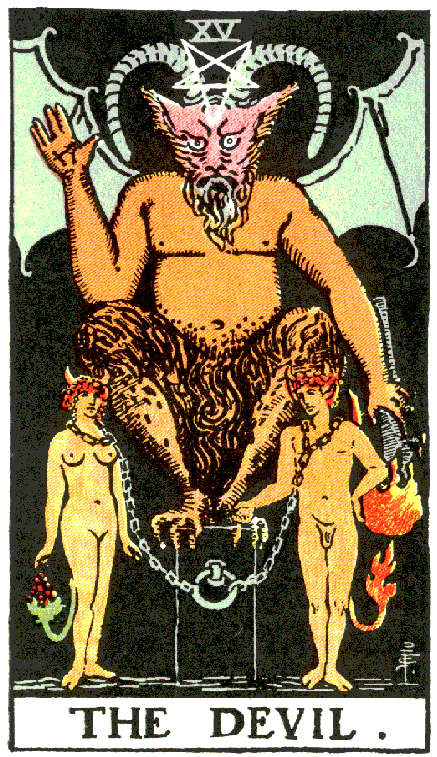 t
is said in one of the Indian myths that God’s first feeling was
of fear, and because of that he precipitated an earth inside to give
himself security. Therefore the earth is called terra ... and
terror is the same word. Terrification is the word used to
translate the same idea in Jacob Boehme’s theosophy. So when
you become afraid you actually start to precipitate materials in your
body. If you become confident, certain other processes go on in the
body which eliminate the products of previous terrifications. So that
optimism, confidence, faith, actually washes away, solves the toxins
created by fears. Fears actually precipitate real material
substances. [55:37]
t
is said in one of the Indian myths that God’s first feeling was
of fear, and because of that he precipitated an earth inside to give
himself security. Therefore the earth is called terra ... and
terror is the same word. Terrification is the word used to
translate the same idea in Jacob Boehme’s theosophy. So when
you become afraid you actually start to precipitate materials in your
body. If you become confident, certain other processes go on in the
body which eliminate the products of previous terrifications. So that
optimism, confidence, faith, actually washes away, solves the toxins
created by fears. Fears actually precipitate real material
substances. [55:37]
One drawing, something like this, I’ll do it very simple so that we can do it quickly — he’s a funny fellow I think — and this weird gentleman is supposed to be the devil.
[Eugene makes a drawing. The Waite deck Tarot Devil is depicted, left.]
He has a torch between his horns, lit. He has one arm pointing up and one arm pointing down, and he has goat’s legs. And he’s standing on the earth. That one has the word written on it, Solve, and this one is Coagula. This is the arm that solves, this is the arm that coagulates. And we said before that this right side has to do with the volitional side, with the force side. And this left side has to do with the idea. And an idea is the coagulation of the feeling. This is a reference to the two keys of binding and loosing that Christ gives to the disciples2. This figure which is called the devil is defined to be the devil by the church, at a certain period when the same figure was being worshipped by the Knights Templars and they called him Baphomet. The idea here is that there is a goat’s head, there’s his beard, and he is the scapegoat who decides that he will pay the price of knowing how to loose and bind in himself. He, from that moment, is going to have the light of the individuated being to guide him ... the horns of being in that being, the horns of the dilemma, to remind him. Horns mean power and his power is precisely the product of his knowledge of solving and coagulating, of loosing and binding. He knows that the T and the O there belong to binding, and that the A and the R belong to loosing [T.A.R.O.]. Therefore he knows that in any situation whatever, when he meets another human being, that being has something it would like to have solved and something it doesn’t want to have solved.
Many psychologists come up against this problem which is very difficult for them, because the patient comes with something to be solved, and something it doesn’t want touching. And it’s precisely the part that it doesn’t want touching that is the cause of the problem it wants solving. Actually, it turns out to be financially very profitable to the psychologist because nobody gets cured, and they keep coming in sixteen years time [laughter]. [58:44]
As far as our own economy is concerned, the meaning of this to us is: examine ourselves for that which is already coagulated — namely a fixed attitude to the world which we think we shouldn’t lose because it’s very valuable — and another thing that we are prepared to let go of because we think that it’s not important. And we cannot in the first place want to tie something we don’t care about, and we cannot want to loose something that we do care about. And yet the whole meaning of this image is that both are true. Somehow we’ve got to tie up the loose ends and loosen the tied ends.
S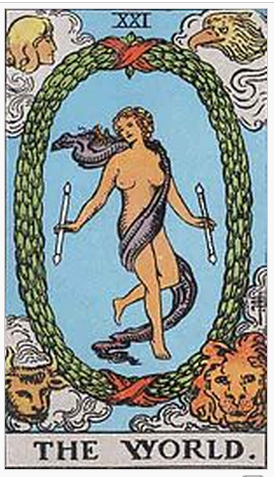 o
this devilish figure is really a glyph of God. The Gnostics used
another figure, rather similar except that it had a cock’s head
at the top crowing away, and it had a man’s arms making
symbolic gestures, and then it had serpents for wings, like this. Now
this another form of the devil but it really was the glyph that they
used for God. And the serpent’s four legs meant adaptability in
going about in life ... instead of having legs with bones in that
work on a lever system, mechanically, continuous adaptability. Let’s
put eyes on the toes to make sure that they are serpents. In going
about in life ... infinite adaptability. In the head was the cock,
which to them symbolised courage, and to Christians symbolises the
betrayal of Peter ... and vanity. They meant by it courage, because
they were a cock-fighting crew. And everybody’s entitled to use
their own symbology the way they will use it. [1:00:54]
o
this devilish figure is really a glyph of God. The Gnostics used
another figure, rather similar except that it had a cock’s head
at the top crowing away, and it had a man’s arms making
symbolic gestures, and then it had serpents for wings, like this. Now
this another form of the devil but it really was the glyph that they
used for God. And the serpent’s four legs meant adaptability in
going about in life ... instead of having legs with bones in that
work on a lever system, mechanically, continuous adaptability. Let’s
put eyes on the toes to make sure that they are serpents. In going
about in life ... infinite adaptability. In the head was the cock,
which to them symbolised courage, and to Christians symbolises the
betrayal of Peter ... and vanity. They meant by it courage, because
they were a cock-fighting crew. And everybody’s entitled to use
their own symbology the way they will use it. [1:00:54]
So when we look at this card called the world, we are concerned entirely with the relations between the established or rotating forces of the universe, and the polar forces which cause that rotation to come into being. And as we have two groups of four letters, each one giving a square, it gives us an eight pointed star, and eight is the number of infinity and therefore that glyph tells us that in all eternity, there’s nothing else we need to think about. We have already the problem solved. [1:01:36]
|
|
And the third card here is the high priestess, and she is between two columns. We have represented them on the little glyph we talked about last week. But this the high priestess, as opposed to the low priestess, if this is the gross material world and the church itself is a woman, then the church considered in its woman-ness as a personified being is the low priestess. But it reflects all its principles from the world outside itself and the world outside itself is the high priestess. This is the meaning of the word Sophia. The Sophic sphere is the sphere of universal form, of universal plasticity. We said when this vibrates — we’ve drawn this several times — when this vibrates it actually produces all the form that can possibly appear in the time process as a simultaneous, all-comprehending being. And in its simultaneity it is the high priestess. In its serial presentation it is the church in history. The lady should have on her lap a book marked tora. She’s got one. The Tora [Torah] is the law and the law has levels of interpretation ... four levels of interpretation: three are said to be known, one unknown. |
The known level is the — if we like to put it, the vesture here — is the actual words in the bible. Then there is the body. Is not the body worth more than the garment? says Christ. And is not the soul worth more than the body? So there are the actual letters in the bible [Matthew 6:21-25, Luke 12:23 c/w Luke 11:34]. There’s the body which is the meaning of the material application, but it is meaning. And then there’s the soul which is the psychic significance of the law. And then over those is the mystical significance, of which it is said you can’t get at it unless you die. If we remember the first diagram we know that we can’t die without waiting for death. We can die to any of our favourite ideas. We can say to ourselves, Ultimately I will have to give it all up, so I’ll give it up now and see what happens. He who tries to preserve his life will lose it and he who is prepared to lose it will preserve it [Matthew 16:25, Mark 8:35, Luke 17:33 9:24, John 12:25].
If you have a favourite idea, you consider it to be a part of your life. If you try to preserve the idea intact, you isolate it, you s… [1:04:43]
[break in recording]
… words and look at them, and just say, In the beginning god made the world, etc., then that’s at that level. If we think about it, and then say to ourselves, Well, what does it really mean? It means that he made the world. That’s the meaning of it. It sounds very much like the first statement, namely that he made the world.
But if you’re thinking about the meaning of it, you say, well that’s funny, he actually made the world. We’ve now gone into the body of it, instead of just reciting it. You’d think that everybody would mean what they say, but in fact they don’t. People in general can recite words without any meaning at all. They can sing hymns regularly about the precious blood and so on, and it never crosses their mind to say, Is this true or not. What does it mean?
It was said to me recently in a discussion we were having, by a woman very strongly formulated, What do you think about the seven days of creation?
And I said, Well of course, nobody here could possibly be at such a level as to believe that each day meant twenty four terrestrial hours.
To which she said, Oh, I’ve never thought of that. But I do!
Now she’d never thought of it. She’d just recited the words. ‘Seven days of creation’. She hadn’t thought what it meant. And therefore she hadn’t climbed on to the body of it. When she was made to think about it, she said, Oh, she did mean that. If it said days it meant days and the days that it meant were the days she knew ... namely terrestrial days.
When I pointed out that if this were a universally true gospel being preached to Jupiter inhabitants the length of the day would differ, because the orbit of Jupiter is different, she became a little confused and decided to leave it for the future.
If we had considered this possibility: that in all spheres whatever, regardless of the rotatings of particular planets, there is another significance to the word day ... namely any creative period whatever. Our word day is the Hebrew word yod, reversed. Now that yod is the hand, it’s Hebrew for hand. And it means the creative hand. The hand of god means the creative power. And in every act of creation there is a definite amount of energy involved and a definite amount of time involved in expending the energy. So the word day symbolises a period of creative activity. In that case we’ve got to the soul of the matter. [1:07:28]
But there is also a fourth one that is unknown. We now know the soul of it. It means any period of activity whatever. But there is another one outside there called unknown. Now remember we said that the word known has got a k in it which means closure, and the word now ... to know.
To know a thing is to formulate it, and to formulate it is to circumscribe it. To circumscribe it is to impoverish it because it deprives it of the relations of the other things you’ve not included. So the thing that you know is not the highest. But that which you will unknow depends on the meaning of the prefix, the un. [1:08:13]
Now that un is not the simple negative that is pretended. And many dictionary words would prove it. It means the movement of urge power. In the Egyptian unu — which is the same word written two ways to express its coming-and-going-ness — is the name of the hare, the animal which symbolises fecundity ... creativeness. The hare, like the rabbit can breed very, very quickly. It can also jump. It doesn’t crawl on little pedal extremities like a centipede, and the jump therefore means intuition. It leaps to conclusions. And actually the hare is remarkably intelligent. It jumps to conclusions that the doggies with their noses on the ground can’t always discover. So this un we translate as the unknown, then we know what we know ... we are referring in the word unknown to an urge motion.
So if we now consider the fourth meaning, hidden, the unknown meaning — we are concerned, we said the soul meaning is any creative period whatever — and this tells us that the hidden, the unknown meaning, the highest possible, is simply urge, expressing itself. Now that fourth meaning is very, very dangerous and governments don’t like it because in effect it says, If you have any urge and you cause it to flow, there is no ground whatever for invalidating it absolutely. A man can define it as wrong if he can find out about it. A government could define it as wrong if they knew about it ... because they are finites. But this unknown is something they can’t find out about ... it works at undefined levels. And the law of the land is only concerned with definition. [1:10:35]
You know that the beak [colloquialism for ‘judge’] in applying the law says, I must apply the law. And the law is embodied ... the law is expressed. And because it is defined, every definition of the law is a loophole ... the Gordian Knot. The word Gaud itself — the G.A.U.D. — is the name for this loop. It’s called the garter’s deceitful loop by Shakespeare3. And it’s the same knot that Alexander didn’t bother to untie, and cut it. It is the knot of the unknown, because he knew what the unknown was, and he knew that all the things that were said to him — you can’t do this, you can’t do that, there are forces in existence already — could by a man with sufficient strength of mind be ignored. And he then went off and ignored them. And he therefore conquered the world ... but he burnt himself out at a very early age. He’d just got over the thirty mark before he conked out. He’d used up all his unu in the process. But he had managed to live and mark the earth with his name ... better than some people who live three times the years that he did.
So the law depends on this looping. And the law always comes out of the undefined into a definition, and goes out again into the undefined. The law pretends that it is a closed circle. But it isn’t, because every law has been arbitrarily posited by this gentleman down here — the king, the canny man, the Cohen, the Cain. He has defined that there is no V on the top of it. He’s deliberately left that V off. And the V means transcendence, developing, going beyond. So there is a pretence that there is a complete system of law. But any business man who’s had to wangle things a bit — say forms of permission for import/export, etc. — knows that the law is not a closed system, and that the mere fact that it is defined in the first place arbitrarily by human beings, means that there is a possibility of finding a hole in every closed situation through which you can go.
Hence Groucho Marx’ business name is Loophole the Legal Eagle. The idea of the loophole and the Legal Eagle joke is simply because the eagle is the symbol of the a priori intellect which, looking down on the whole situation, can see from what point the definition has been drawn ... and he can also see beyond it. So we see that the very worst thing in the world is the best thing in the world when you understand it.
The worst thing in the world is undefined force rushing about, tumbling about in the body, driving people into silly situations. And the best thing in the world is reason, application, conformity, and so on.
But the worst thing — namely, that prime drive — when it has been through the process of formulating, has formulated itself completely. It is then mature. It can then come back into the free. This is dome and this is free. When it goes back into the free it can then say, I know now what formulators do. I know now what bureaucrats do, they print forms. And all the people that can’t read put a cross on the bottom and then send the money out. But some people who can read know the origin of the words and they say, ‘Well I think I’ll go and see this fellow, and do something about it’. And wherever this consciousness of the finite nature of definition and the impoverishing nature of definition is realised, then something can be done about the definition. And the pretence that nothing can be done about the definition is called in the New Testament a crime against the Holy Spirit. To pretend that a situation has been defined and that nothing can be done about it is the same thing as to worship death. There is always something that can be done about every situation, because a situation is defined by a finite being like a human being. [1:15:11]
You remember that the fourth card here is the magician. You remember that we talked once upon a time about that magician fellow before, and he had one hand up and one down, exactly like this devil here. We can use the same figure for him. He’s got a red robe on which signifies his active nature, and over his head he has a figure of eight. That figure of eight symbolises infinity and reciprocal feeding. Here is one being and here is another being and as one being diminishes, another increases. And this is the mystery. He is making this sign, that’s all we’ve got down here ... and the table in the middle with four tricks on it.
N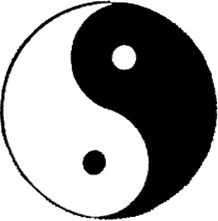
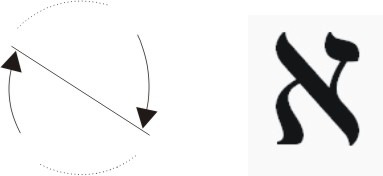 ow
the Hebrew letter aliph, the first letter, if you remember we did it
as a shape like this, the Chinese version of the same thing is that —
a dark half with a light in it, a light half with a dark in it. You
remember last week we talked about the dark form in the light world,
and the light form in the dark world. As far as we are concerned an
idea is a light in the material world. And as far as the Absolute
Ocean of Consciousness is concerned an idea is dark. [1:17:00]
ow
the Hebrew letter aliph, the first letter, if you remember we did it
as a shape like this, the Chinese version of the same thing is that —
a dark half with a light in it, a light half with a dark in it. You
remember last week we talked about the dark form in the light world,
and the light form in the dark world. As far as we are concerned an
idea is a light in the material world. And as far as the Absolute
Ocean of Consciousness is concerned an idea is dark. [1:17:00]
The thing he remembers all the time is this law of reciprocal relation. In his right hand he’s been given a little short rod which is the phallic rod of power. Which simply means power compacted so that it can be used as a baton or beating serpent — bat–on, regardless — and a measuring rod. The rod is a pole or a perch according to what kind of bird you are.
To meditate on this reciprocal feeding is of tremendous value because it says what we said earlier on: giving and taking. To give is better for you than to receive, because it opens doors inside you that cannot open if you will persist in receiving without giving. To receive at the material level is simply to accrete matter. To give is to exhaust and have your matter replaced by spirit.
N![]() ow
we know that in the crystal world — supposing we take a
triangle as a type of crystal — we know that crystals when they
grow, simply grow by accretion, another one will go on there, and
another one on there, and another one there, and so on. And then
it’ll start again wherever it goes. The crystalline world
simply grows by accreting. It grows by addition from the outside. And
we know that the organic world does exactly the opposite. We know in
the organic world it isn’t ac-cretion, it’s in-cretion.
We put the stuff inside, break it down and push it to the outside,
causing the growth of the being.
ow
we know that in the crystal world — supposing we take a
triangle as a type of crystal — we know that crystals when they
grow, simply grow by accretion, another one will go on there, and
another one on there, and another one there, and so on. And then
it’ll start again wherever it goes. The crystalline world
simply grows by accreting. It grows by addition from the outside. And
we know that the organic world does exactly the opposite. We know in
the organic world it isn’t ac-cretion, it’s in-cretion.
We put the stuff inside, break it down and push it to the outside,
causing the growth of the being.
So the organic way is the exact opposite way to the mineral way. And therefore when we start trying to push out the energies, we are really passing from the material world to the organic world, which is the world of life ... the life force of spirit itself.
And we know that in certain diseases there is a tendency under pressure to begin to grow internally in bits, in the mineral way. That is, crystals start depositing in various parts of the body, which means that material forces in certain parts of the body are tending to grow. Sometimes people in a very damp environment will start becoming rheumatic. The gradual lowering of the body temperature is enough to make them unconsciously contract. And when they get the field contracting in the body that itself will begin — as we’ve said about terror, about fear — it begins to precipitate within the organism a material world, a crystalline world. That is, a non-living world, which becomes a nuisance to the life in which it’s precipitated.
So when we look at this figure of eight lying on its side and we think about reciprocal feeding, we say that if we can’t find takers we cannot give. So if we can’t find takers we are going to die, because this mode is death ... the accreted mode is the material way, and it actually encloses. This triangle which might have become organic by the simple accretion of others round it, is stopped. It is no longer possible for it to relate with the forces outside.
If we can get that crystal and smash it and reduce it to tremendously tiny particles so that it can no longer crystallise in its natural form, it then becomes assimilable to an organic being. In other words we can actually drive that thing to bits ‘til it can become incarnate in an organic being. We get this in kinds of chemicals which are actually broken down from the earth and absorbed by plants, and so on. The mere fact that they are broken down to a level below that at which they can crystallize makes them available for use in a living structure, and matter has then become incarnate in life. In the midst of death we are in life4, Paul puts it.
T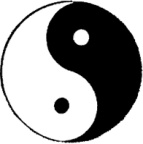 he
earth itself as a mineral precipitate is being progressively
conquered by life. It is being smashed by a variety of invading
forces and reduced to the level where the plant world and the animal
world and the man world can assimilate it. And in the same way here,
we can allow one of these to represent the material world and the
other to represent the organic world. And we can see the diminishing
of one is the enlarging of the other. And we can then see that we
have a very powerful symbol for our meditation. [1:22:11]
he
earth itself as a mineral precipitate is being progressively
conquered by life. It is being smashed by a variety of invading
forces and reduced to the level where the plant world and the animal
world and the man world can assimilate it. And in the same way here,
we can allow one of these to represent the material world and the
other to represent the organic world. And we can see the diminishing
of one is the enlarging of the other. And we can then see that we
have a very powerful symbol for our meditation. [1:22:11]
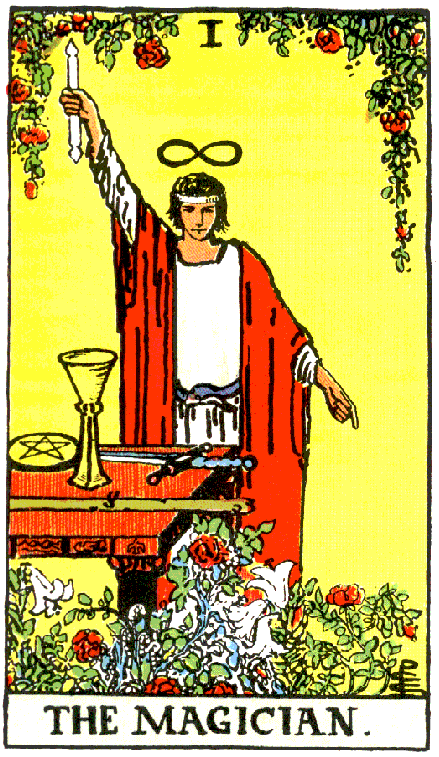 our
Symbols of Analysis
our
Symbols of AnalysisOn the table here the magician has four symbols. We can use those symbols or the symbols out of a pack of playing cards. We remember what they were: hearts, diamonds, spades — is that spades? [uttered as he draws them on the white paper] — clubs. Now those were the four modes of dealing with a situation, either with ourselves or with somebody else.
The appeal to affection, to feeling ... the appeal to the heart. You try to appeal to your own affection. Your concept of yourself as thin being of compassion. You ask yourself the question: Have I any compassion?
If you can’t find it, you then move to the diamond world. You say, Well what am I going to get out of it materially, how will it profit me? What cash am I going to get from it?
And if you can’t think of that either, and the thing is an act that may be disallowed socially, you tell yourself that the police exist, and the navy and the air force, the clubs will come and tap you and put you in jail.
A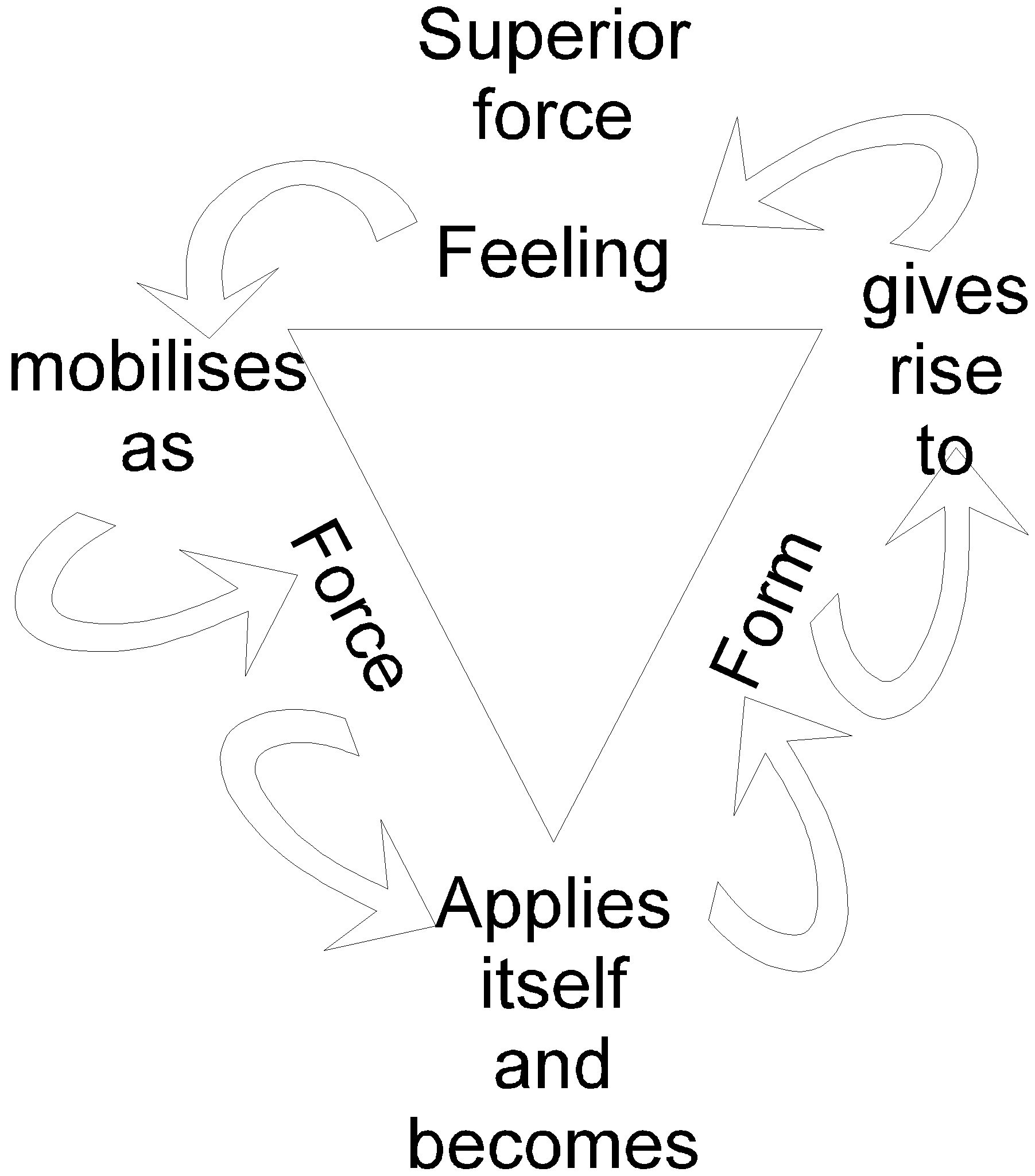 nd
if this doesn’t deter you, you remind yourself that there is
the spade. That you can be buried ultimately for persistence.
nd
if this doesn’t deter you, you remind yourself that there is
the spade. That you can be buried ultimately for persistence.
So by means of these four symbols you can go through an analysis. You can actually relate these four modes to the four levels of interpretation which we mentioned before.
It is very important to see that in using this diamond we are using a crystalline form, and that the idea, the rationale of it — as opposed to the feeling, the compassion of it — is a matter of crystalline structure. That is, ideas as such are dead. There’s nothing more rigid than a definition. If we define a triangle there is no give in it. The definition establishes it, and then the process completely immobilises it.
So that if we meditate on a triangle we will fix our minds with a good support. And then if we think about the possible significance of the triangle, we could write feeling on the top of it. We could write force on this side and form on that side. And we have deliberately given a dynamic value to a static form.
So that when we see the triangle again we can say feeling is the superior source out of which manifest force and form. Feeling mobilises itself as force. And the force applies itself in the situation and becomes form. And the form gives rise to further feeling. So there’s a continuous relation running round the triangle. The triangle then becomes a support for a discursive process of thought.
Whatever we do with an idea, we are dealing with a rigid definition whenever we are clear. And if we are not clear about it, we haven’t finished the work on it. And when we have finished the work on it and defined it rigidly, then is the time we have to translate the idea into action, which we can only do by feeling. Because in every situation there is a certain amount of resistance, a certain amount of possible co-operation. Only by feeling can we tell whether the idea can be applied wholly or in part, now or later.
So if we remember that the idea — which most people think is in a perpetual state of flux — is the most rigid part of us and the physical body — which most people think is the reliable part — is in a continuous state of flux, even chemically ... we find an inversion: that the physical body, which is the thing that we depend upon for our reference point, is quite unreliable until such time as we have formulated an idea of body.
We have to take the least reliable thing — namely the state of our mind — and look at the body, our most reliable, and decide that the body, because of its relations to external situations reacts to stimuli and is therefore unstable. We therefore seek for a principle of relation in the idea. And we establish in the mental field — which is usually in a state of flux — an idea, which then can be used to control the body. This again is a dialectical inversion. And we have to do this continuously ... always turning back. [1:27:19]
We have it here. There is the Yod, the first letter of god’s name, there is the Vaw, the third letter of the name and here is the field between [Heh]. So this is the name Yahveh, itself. That is a very, very simple glyph. Analysed in the Chinese way, they would say there is no material situation without its possibility of experience giving birth to understanding, and there is no consciousness which is such that it doesn’t need an idea in it to centre itself upon it. So whatever nationality it is originally, whatever nation we decide to borrow it from, the significance is fundamentally the same.
Have we got any particular points? [1:28:16]
[New questioner: X] I asked about the tower because I thought there was a rather obvious meaning. That is, of a building, a material fortress, which would ultimately be destroyed. I thought you would go far beyond that, of course. Is it only time that destroys that?
Well time is not really an abstract idea. Time is actually an emission of force. When ... if you get a house and that represents the tower ... you build it. Supposing you go away for thirty years. There would be nobody in charge of the house. When you come back it won’t be in as good a condition as it was when you built it. Now time as an abstract idea couldn’t affect it at all. But in fact there are forces which manifest through what we call time. William Blake said time is a being, not an abstract idea. An abstract idea can do nothing to a material house. In fact there are forces continuously at work boring into the stones. I don’t mean simply worms and things, but also other forces knocking out particles all the time and reducing everything in the material world down to dust, deliberately, so that it can be absorbed and converted into an organic state.
The house that is used lasts longer than the house that is not used, because when it’s being used by you, you are actually feeding it with energy. And when you are not using it at all, the intelligent forces of the universe are determined to break it down. The same thing happens with a stored motor car during wartime, and so on. Actually, the vibration that a thing is given in use helps to integrate it. And simply to leave it alone completely is to leave it the prey of forces of disintegration. And those forces are claiming it for use by other beings.
So at the purely material level, when you make your tower, you build your home — like good Englishmen you call it your castle — and it will break eventually. And the time when it will break depends quite a lot on the way it is used. And again, inside that tower, assuming that you’re a married man, is somebody with a red dress, and somebody with a blue dress, and there is the crown which one or the other, or a third party if you’ve got a mother-in-law, will be trying to wear. These three forces must exist, but the length of life of the castle you build depends on the use to which you put it. And the same with human beings ... they have also hard towers.
If you feed a person with ideas or with feelings, and so on, you build the person up. Like Abraham said, when they asked him, if you were ill — as he is the specialist — what would you recommend as treatment for yourself in hospital?
He said, two pretty nurses.
When he said that, he was talking about the emotional ground of health. He was saying in effect that far more valuable that all crystalline strictures, all externally applied things, injections and so on, is simply emotional relationship. That it is possible to be fed by emotional attention, and to get better through emotional things in the same way that it’s possible to be killed by the deprivation of such.
A nurse I was talking to fairly recently said that she didn’t enjoy working in the women’s wards, but she did enjoy working in the men’s wards, because the women were ungrateful and the men were always grateful ... and she didn’t know why.
I said, perhaps if you had been a man, you would have enjoyed working in the women’s wards ... because they would have responded differently.
And that had not occurred to her. There was a real reason why those men responded to her. They liked to get better for her, just like the ladies didn’t want to get better for her, on principle. It’s a question of putting the two north poles or two south poles of a magnet together ... they must reject each other. So when you are building your physical house or your own physical body, or an ideological structure, it has its time. And its time depends on how much energy you can keep putting into it.
[X] Even if it’s false fundamentally it’s still a fact?
If it’s false fundamentally it can’t stand at all. False means falling down. There must be something in it not false in order for it to stand. For instance, no architectural structure can stand up unless you obey some principles. You can’t build a bridge on an entirely false principle. You can’t stand a brick wall up without observing the rules. This is why it’s said theologically that evil as such has no reality. Because if by evil we mean non-existence — which death is a part way to — then it cannot have any reality at all. If a man is healthy, whole, complete, he doesn’t say he is suffering from an evil. But if he becomes diseased and starts falling to bits then he begins to think he’s in a bad way. So that wholeness, completeness, internal relation, structure, and so on are all synonyms for the good ... and lack of principle, falling to bits, are synonyms of the bad.
[X] Something occurred to me immediately I saw that card, because they were talking about themselves. Because people were in that tower weren’t they?
Yes
[X] And it immediately seemed to be to be a tower of material things.
Yes? It need not be. Any idea whatever, set up for the wrong reason, would suffer the same fate. We’ve seen churches overthrown by definitions which have been proved faulty. Faulty is the same as falling. Faulty is only that ..[indistinct]…
[Khen] Say you took a building, a structure — the term there of use and not use ... would that be sufficient to keep that structure fed, regardless of the use the structure was put to? Say you took a structure like a church, for example, and primarily it is used for we’ll say positive ideas, and then somebody comes along and perhaps uses it for perhaps negative ideas. The idea of use and not-use would not apply to the type of ideas used in it — or would it?
Oh, yes.
[Khen] It would?
Yes.
[Khen] Merely the fact that it wouldn’t just constitute this energy going into that?
No. The nature of the energy would…
[Khen] The nature of the energy would exalt as well?
Mm. At the very lowest material level if a man went in there determined to manufacture very heavy machinery, it will get quite a big knock wouldn’t it? …
[Khen] Yes.
… compared with somebody going to use it as a debating hall. You notice that some places used for committee meetings when you go in, are the most dead and depressing places in the world. And they have merely been used for the thing at which, although it’s in use, everybody’s falling asleep. Everything goes to sleep. I think railway waiting rooms are about the top level, aren’t they, for that sort of thing?
[Charlie Blythe] They are waiting places.
They are waiting places.
[Khen] But it must be so because if you apply it to the individual, then if he has negative ideas, obviously he’s not going to produce that state of being which is only going to be produced by positive action is he?
That’s what I meant by saying that you can’t get any sub-entity inside yourself to obey you, if you tell it that it will always not get its own way. Bread and circuses is the governmental reply to that.
If you said to the workers, well, you will never be bosses ever, and it’s going to go on like this and the same with your children, they’ll kick. This is why the Marxists say that religion was invented for … in order to fool people. So they say. That is to say, you say to the people, blessed are they that mourn now, for they will be comforted in the next world. Blessed are they with low wages for they shall have high praise, and so on. [chuckles from the audience]
It has worked for a long time. During the — say, the period that William Blake was complaining about — the dark satanic mills. The people at the top he said the force of desire in them for material possessions … that force, gathered together, became terribly dogmatic theology. So that the leaders of the big mills had four-year-old children at work in them, were pillars of church respectability … and very dogmatic. [1:38:58]
As far as the physical body of a human being is concerned, the whole destiny of that being depends on how he uses it … every bit of it. Each part has a definite use. And the use to which you put it determines how it will respond. And therefore you can actually die in bits. One part of a body dies before another part, because it’s been abused more than the other part. So there are various kinds of death. Roughly speaking in yoga parlance, there’s two ways of dying, two broad divisions: dying in the nervous system and dying in the blood system.
Dying in the nervous system is caused through over-ideation.
Dying in the blood system is caused through over-emotionalism.
And all the organs in the body have their relations with those two systems. So there are two ways of dying, as a broad issue. You can abuse your kidney, you can abuse your liver, you can abuse your brain. And wherever you break down you’ve been doing something naughty … even if it’s only boiling PVC on a gas ring or something.
[Charlie Blythe] In the word unknown, the un part of it ... is that the same un we came across in the word unconscious?
That’s the one, yes. It’s that of which you are conscious when you are in deep sleep.
[Charlie Blythe] You did tell us about that once. I can’t say that I’m really terrib;y clear on this ‘un’ business. When I’m unconscious I don’t seem to know anything.
No, that isn’t true. You don’t know whether you know or not in that phase, when you are not in that phase. In your present waking state you are using a particular part of your organism that by its very nature cannot know the other way.
When you are in your waking state you are dependent on the five sense stimuli, aren’t you? The result is that all the ideation in your mind is in terms of five sense stimuli. It’s the exact opposite of the consciousness of the un, which is not in any sense dependent on those things but is very, very conscious of the direction of the flux of the Absolute movement … which is intelligent volition. It’s that movement that is busy building you up when you have been wearing yourself out. You wear yourself out in the daytime, and then — if you don’t exhaust yourself too much in dreaming — in the unconscious state, this intelligent force is consciously moving onto damaged organs and building them back into shape. It really works.
[Charlie Blythe] Yes, but we don’t seem to have a recollection of it, do we? We don’t ...
Not in the waking state, with your five senses. But if you practice that introversion method of cutting out five-sense images, you won’t have an awareness of nothing … you’ll have an awareness of a constructive whole power. And you will know what it’s doing.
[Charlie Blythe] And this would apply in unconsciousness due to anaesthetics?
All that the anaesthetic has done is put out of action by an external material trick the one thing that will interfere with it. That’s why so many people say that when they are going under an anaesthetic or coming out of it … they have the most peculiar experiences, and think they’ve got something to do with another world. They have. But when they try to remember them, they try to remember them in terms of five sense imagery, which is not really the thing it belongs to.
It’s like Huxley’s mescaline experiment. When he translated what he thought he had experienced into terms to write a book for other people, he had to use five-sense images. It then becomes untrue with the experience.
It’s another way. Supposing a man had been born blind. He had no idea what you would mean by the word colour. If you said, Red, blue, yellow … it is all meaningless to him.
And he’d say, I can’t think what you’re talking about.
And you’d say, Well, you see, you are deficient in an organ. I’ve got it and you haven’t.
Yes, but what is it like?
Well, I can’t tell you, because you haven’t got it.
And then a very, very clever surgeon comes along and grafts him in a pair of eyeballs from an old widow or something [laughter], and suddenly he says, oh, now I see. He knows what you are talking about.
It’s exactly the same with the unconscious. This unconscious is a valid experience, just like sight is to a man not born blind. And you don’t try to translate sight into the smell of fish and chips, do you?
[Charlie Blythe] No.
So in the same way you wouldn’t try to translate the unconscious into five-sense images.
[Y] Is that what the author of ‘The Cloud of Unknowing’ was trying to say?
Yes. He’s most insistent throughout it, about the necessity of cutting out this sense stimulus in order to get at that which is not five-sense stimulus.
[Y] That is what he meant by the cloud, is it?
Yes.
[X]But we say untrue, unkind, unfair, un…?
Yes, but it means that. Truth itself is a lie. It’s the word law, isn’t it - True? We say that is true that obeys the law. We say, The true man is a man of principle, a man of form, isn’t he?
[X] Yes.
That’s alright. All form is laid down. And everything that is laid down is a lie, because it’s a definition. It’s a finite. The untruth is what Christ was talking about.
They come with the law and say, Here’s a woman taken in adultery. We will now stone her.
He writes in the ground, Where were you last Saturday night?
You see, and the bloke looks at it and says, Hm. He must have been watching. [laughter] He goes away. He won’t throw a stone. Gradually everybody goes away because they were all somewhere last Friday night when the ????
Now that’s the untruth. The untruth is that truth that transcends all definitions of men. And it is not a moral truth. It’s superior to that … it’s not inferior to it. It’s superior to it. The unmoral man, as opposed to the immoral man, is a very superior being, because doesn’t ever get down to the level of making such stupid definitions. An immoral man is a man who believes that morality is higher than himself, doesn’t he?
[Y] So this in Isaiah somewhere says the same thing, doesn’t it?
Yes.
[Y] Monism. It does transcend the law?
Yes. Paul is talking about it all the time. Before the law there was no sin, because whatever anybody did at that time, nobody had said, You can’t do that. And then the law was made, whereupon it was discovered everybody was sinning.
[Y] Did H.G. Wells have a short story about that? Some apes? It’s so many years since I read it...
They are always continuously reverting, all the writers, you know, to these fundamental concepts … because they can’t go to anything else. There is nothing else to go to. What you call a good book, a good play and so on, is simply a return to fundamental principles. It can’t be anything else.
Sin is supposed to be separation from god … theologically. God is good, therefore sin is separation from good. So every time you’ve been separated from the good you have sinned. Or the person who separated you from it has sinned.
[Charlie Blythe] How would you relate the word bad to that? Sin is regarded as bad, isn’t it?
Well, bad is the house of division. The house divided against itself shall not stand. Good is what you can assimilate. Bad is what you can’t. You throw one thing into your tummy and you feel fine. You throw another thing in and you feel terrible. The first is good … the second is bad.
[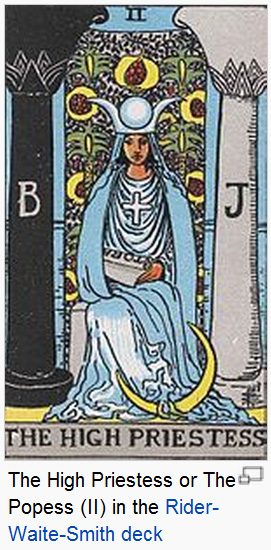 Y]
Is this act of unknowing something that you can acquire? That’s
what you’re trying to teach us here, isn’t it?
Y]
Is this act of unknowing something that you can acquire? That’s
what you’re trying to teach us here, isn’t it?
Well acquire isn’t really the right word. What you have to do is remove the obstacles. It’s already there. The obstacles are this persistency of leaning on the external stimulus world. It isn’t something that doesn’t exist or something that has got to be dug for like a finite treasure. You are already in it, only you can’t see it because of the interference.
[Y] It has to be found?
Not in the sense that you would find a treasure, but it has to have all the obstacles to it removed.
[Y] An unveiling?
Well, if you like. The idea of courtship is used by the Persian mystics and by many, many warriors or thinkers about it.
There’s a certain girl that is the infinite wisdom, the high priestess. How do you get at her? She is already there. The thing is … can you remove the obstacles?
[Y] Yes.
It won’t be any different. And most of the obstacles are in the mind of man, aren’t they? That’s the thing that stops most young men chasing particular girls … it’s the belief that they might be said No to. That’s their chief paralysing force isn’t it? They are actually not sure of themselves. And their lack of surety is the precise reason why they don’t get it.
~~~~~~~~~~~~~~ End ~~~~~~~~~~~~~~
1 Matthew_18:7 Woe unto the world because of offences! for it must needs be that offences come; but woe to that man by whom the offence cometh!
2 Matthew_16:19 And I will give unto thee the keys of the kingdom of heaven: and whatsoever thou shalt bind on earth shall be bound in heaven: and whatsoever thou shalt loose on earth shall be loosed in heaven.
3Henry the Fifth, Act I, Scene I.
CANTERBURY. Hear him but reason in divinity,
And, all-admiring, with an inward wish
You would desire the King were made a prelate;
Hear him debate of commonwealth affairs,
You would say it hath been all in all his study;
List his discourse of war, and you shall hear
A fearful battle rend'red you in music.
Turn him to any cause of policy,
The Gordian knot of it he will unloose,
Familiar as his garter; that, when he speaks,
The air, a charter'd libertine, is still,
And the mute wonder lurketh in men's ears
To steal his sweet and honey'd sentences;
So that the art and practic part of life
Must be the mistress to this theoric;
4 Romans_6:4 Therefore we are buried with him by baptism into death: that like as Christ was raised up from the dead by the glory of the Father, even so we also should walk in newness of life.